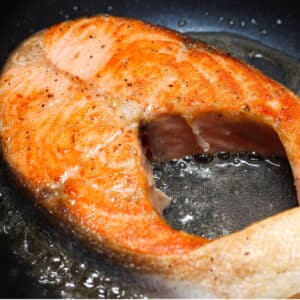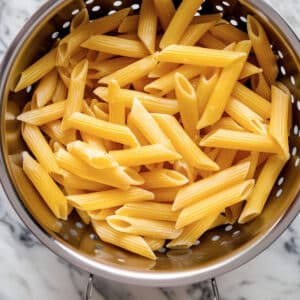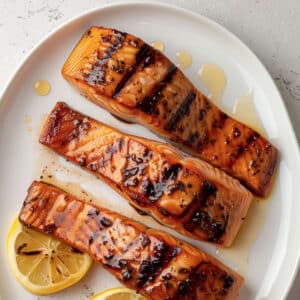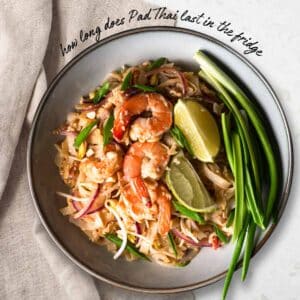You have prepared a batch of cooked chicken. It was a spectacular dinner, and now you place it in the fridge – with the purpose and intent of consuming it the next day or the day after next. Then, you receive a dinner invitation. Perhaps you saw the takeout menu on your desk and started craving that instead.
Now, here you are – wondering if you have waited too long. Can you eat cold chicken? Is the leftover chicken still safe to consume? Are there different ways to eat your leftovers?
In short, the answer is "yes." It is safe to consume cold chicken. Assuming the food was cooked through and you stored it properly. When you fail to prepare or store food properly, you may become sick as harmful bacteria develop.
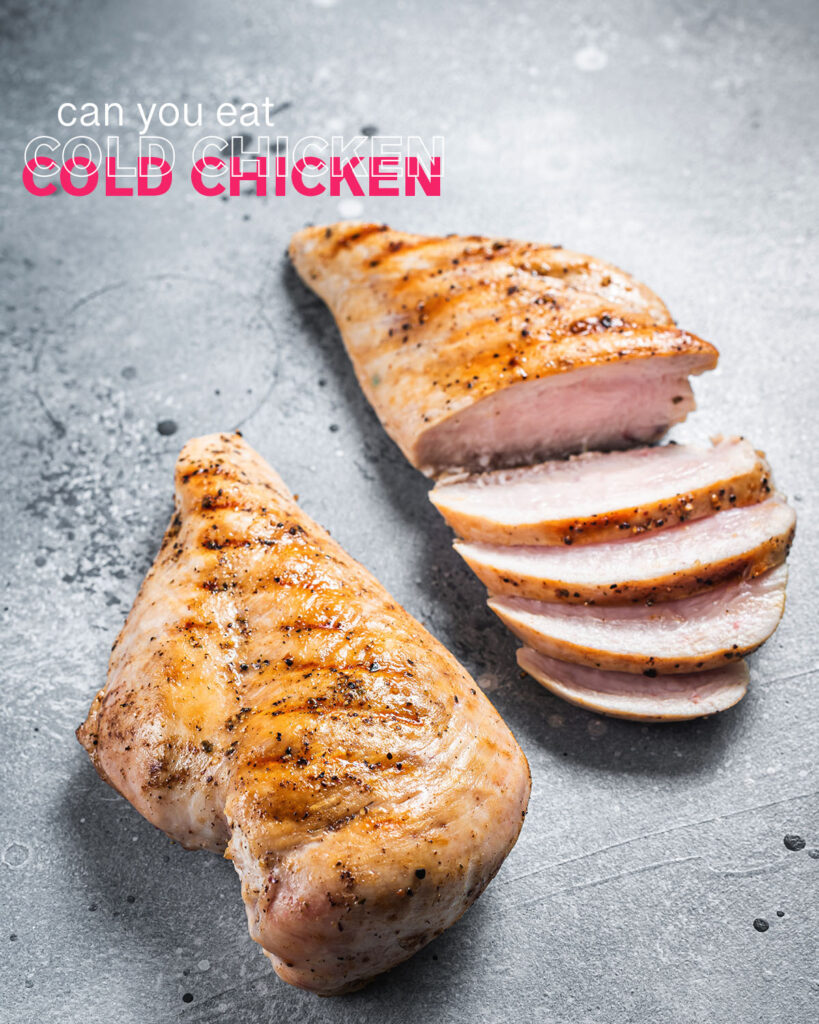
Why would anyone like chicken so much?
Besides the great taste, the advantage of this dish is that it keeps well in the refrigerator for up to 4 days, and you can eat it cold.
Learn how to determine if the chicken you have prepared is still safe to eat by reading this comprehensive guide. I will also outline how to properly store the meat – whether cooked or uncooked – in the refrigerator and the freezer. Additionally, I will share some delicious recipes with you to make a perfect addition to absolutely ANY occasion!
Can you eat cold chicken?
Certainly, chicken is high on the list of food options. It is delicious straight up, but it is also great in salads, stews, soups, wraps, and many other dishes. As a cooked dish, can it be served cold? Yes! The advantage of chilled cooked chicken is its great taste, texture, and flavor.
As a point of clarification, let me outline the differences between these words:
- Cold
- Frozen
- Raw
There is nothing wrong with eating chicken cold, but it should not be frozen or, even worse, raw!
Let's explore why they're different.
Raw chicken meat comes from a fresh chicken that has never been cooked. Consuming raw chicken poses a risk due to the rapid growth of bacteria naturally in raw meat. Consequently, it is imperative to cook chicken before eating it!
In the case of frozen chicken, the meat has been kept below-freezing temperatures for an extended period.
Whether the chicken is fresh (raw) or cooked, you can store it for up to 6 months in the freezer. However, a fully cooked chicken is the only way to eat it.
The traditional chicken salad used in sandwiches and dips is one of the most famous recipes for cold chicken. On the other hand, some people like to consume chilled chicken straight from the refrigerator. That's totally up to you!
After sitting for more than seven days, you shouldn’t eat leftovers. The chicken should be consumed as quickly as possible – between 1 to 4 days after the preparation, which can vary. Compared to a whole roast chicken, or a piece of roast chicken, leftover chicken nuggets and patties are safer to consume.
Is cold chicken taste good?
What does it taste like? You can't get much better than cold chicken. For starters, it is absolutely delicious! The texture of a warm chicken is generally softer and more pliable than that of a cold one. A cold chicken is generally more solid and firm, giving it an excellent addition to salads and sandwiches.
By refrigerating the chicken, you allow the seasonings to fully penetrate the meat and the flavor that comes with it. People prefer cold chicken to warm chicken for this reason. It goes great on sandwiches, salads, and other dishes with such a mild taste.
More articles related to this:
Is cold chicken safe to eat?
Yes, it is safe to munch on cold chicken – just so long as it is fully cooked and prepared ahead of time. Be sure to handle the meat with care and store it properly to avoid contamination. Before placing it in the fridge, allow the warm chicken to cool completely. Once cooled, add it to either an airtight container or a proper storage bag to maximize preparation.
It is best to serve them cold from the fridge within 1-4 days. Any longer, the meat has the potential to experience bacterial growth and become contaminated.
Always place your cooked chicken (and other meals) on the top shelf in the fridge. Naturally, consuming it can result in severe illness in humans and pets. You should store all raw meat in the bottom section of the fridge's interior.
Precautions when eating cold chicken
Contaminated meat and bacterial growth - especially in chicken - are absolutely harmful. It can be life-threatening in some cases. You can take several safety measures to keep yourself and your loved ones safe.
A few guidelines to keep in mind are:
- Always cook chicken thoroughly before eating. 165°F is the minimum internal temperature required. The temperature is high enough to kill bacteria like salmonella. You should never eat cold, uncooked chicken.
- To store cooked chicken in a refrigerator, allow it to come to room temperature first.
- It would be best always to store cooked poultry in an airtight container. Ziploc bags are a safe alternative. You should place the date the meat was cooked on the container/bag to ensure that you consume it within a safe period.
- You should eat the chicken within 3 to 4 days from when you cooked it. Bacteria can multiply as the chicken sits in the fridge for too long, and this is why eating old chicken can make you sick. It is, therefore, necessary to label food containers with the date you prepared them for health reasons.
- Raw meat goes on the bottom shelf in a refrigerator, while cooked meat is kept above the shelves to prevent cross-contamination. It is advisable to store raw chicken in the bottom of the fridge to eliminate contamination.
Does fried cold chicken differ from cooked cold chicken?
Cooked chicken differs from fried cold chicken mainly in its texture and temperature.
Chicken is tender, easy to chew, and quick to swallow in its cooked state.
Cold, fried chicken retains its texture but loses some consistency.
There is still plenty of tenderness and ease of eating in the meat, although some moisture is lost, which reduces the suppleness by a small amount.
To your surprise, the warmth of your mouth allows you to warm up the chicken again, which explains why, when you swallow it, you do not notice any temperature difference.
Be aware that the consistency may change slightly when fried cold chicken is breaded due to its cold temperature. There may still be some crunch to chicken skin; despite being breaded or not, the texture may remain intact after refrigeration.
If you want to get the most flavor out of chicken skin, the fattiest portion of the chicken is to consume it at room temperature."
Flavors, however, typically stay the same.
The safest way to store leftover chicken
The chicken should not sit out at room temperature longer than two hours after being cooked to slow down bacteria growth. Label the container the moment you prepare it.
Fridge storage is appropriate when you don't consume your poultry for more than four days as a rule of thumb. Place the chicken in an airtight container or store it in the freezer if you do not intend to use it quickly. It may last up to 6 months when stored in this manner.
Simply store it as follows:
Step 1
Cook the chicken thoroughly, ensuring an inner temperature of 165°F is reached. Set the chicken out, covered, for no longer than 2 hours. This will ensure that the meat reaches room temperature. If left out any longer, bacterial growth may occur, and/or the product may become contaminated.
Step 2
Once cooled, place in an airtight container. You may also place it in a freezer bag. Then, completely seal off the meat for optimal protection.
Step 3
Get your masking tape ready. Tape it into the container or bag you intend to use. Write the date that the chicken was cooked and write what it is – fried chicken, boiled chicken, baked chicken, etc.
Step 4
Place the chicken in the fridge on the top shelf. Do not place them on the bottom or near where raw meats are stored. Be sure to consume the chicken within 4 days. Store it in the freezer if you do not intend to use it quickly.
Will eating cold chicken lead to food poisoning?
Food poisoning can indeed occur when cold chicken is consumed under certain circumstances, including:
- if the meat is past its expiration date
- Consuming meat that is not adequately cooked and partially raw (bacterial growth)
- Getting into contact with a dirty or contaminated medium (like dirty pans) when cooking meat
You should only cook chicken in a clean area, with your hands clean, with an internal temperature of 165 degrees, and there should be no danger of food contamination.
Refrigerator life for chicken meat is about three to four days in a well-sealed container. Excessive exposure to external factors such as air, kitchen surfaces, and other elements leads to meat being susceptible to contamination.
When in doubt, freeze leftovers.
Once your chicken has been sitting in the refrigerator for 3 to 4 days, and you aren't going to eat it in that time frame, freeze it to extend its shelf life. However, as explained by State Food Safety, freezing does not reverse bacterial growth.
As soon as you take the frozen chicken out of the freezer, bacteria will flourish again. In other words, if you freeze leftover chicken after it has spent two days in the fridge, it will only keep for an additional one or two days.
Frozen food left in the freezer for a considerable period is safe, but freezer burn may occur, leading to changes in taste and texture when frozen longer than 6 months, or even just 2 months.
As a general rule, if you notice the food tastes off somehow, get rid of it, no matter how long you kept it.
Keeping track of your leftovers with a date tag simplifies the process of determining whether you should discard the chicken.
How to freeze cooked chicken
Occasionally, you may freeze cooked chicken. If you do this, make sure the chicken does not stay at room temperature. Should there be a leftover chicken that you can store for future use, store it quickly in an airtight container after cooling down.
What is the significance of this step?
The rapid reduction of meat's temperature reduces contamination risks and foodborne illnesses. Following this process, you can store the chicken in the freezer until later. Here are more tips on freezing food.
Even if you are not planning on freezing cooked chicken, it's great for rotisserie chicken dishes.
Step 1
To ensure that your chicken has reached a fully cooked state, you should aim for an internal temperature of 165°F. Invest in a meat thermometer for optimal results.
Step 2
Allow your chicken to cool completely, but keep in mind that it should not be left on a counter for longer than two hours to safeguard against bacteria.
Step 3
Upon cooling, divide it into single servings or portions for your family. Transfer the chicken portions to airtight containers or freezer bags, and then freeze.
- If you use containers - consider placing a piece of plastic wrap over the chicken before popping it in the freezer. After packing the container, as usual, seal it.
- When using a zip-top freezer bag, remove as much air as possible before sealing it up tightly.
Step 4
Stick a masking tape to the bag and mark the contents and the date. As you prepare food, you will be able to recall what you made and when ensuring you don't consume expired food.
Step 5
It is good to freeze portioned chicken for no more than six months and then consume it within that period.
How Long Does Cooked Chicken Last in the Freezer?
Whenever you cook a large amount of chicken to eat throughout the week, be sure to portion it out and freeze it so you can take it out as needed. The method will prevent harmful bacteria from growing in your chicken.
After cooking the chicken, it keeps for at least six months in the freezer. Apparently, the food is still edible in this instance, although the flavor will probably be somewhat unpleasant, and it may have been frozen burnt.
Because of this, packaging food airtight is essential for preserving its freshness.
Easy leftover chicken dinner ideas.
Leftover chicken is a blessing, so make the most of it. The versatile nature of this great-tasting meat means you can use many creative ways to prepare it. It can be a main dish or a side dish. It can even be part of a larger meal. You can repurpose almost anything, and it is super simple!
Listed below are a few ideas:
1 Prepare some chicken enchiladas
Who says you can't have a little Mexican food every now and then? Make the most of that leftover chicken, throw together a few ingredients, and have a batch of delicious, cheesy, saucy enchiladas!
2 Get Creative with salads
Salads are delicious and visually appealing, but they are not very filling. The dish changes if you cut some chicken into cubes before serving! The chicken can be boiled, fried, or even grilled chicken! Anything goes!
3 Cheesy chicken dip recipe - easy and quick!
Put some leftover chicken and cheese together with some veggies, and voila, you've got a delicious dip to serve with vegetables, chips, or crackers!
4 Have a pot pie night!
Grab a cast-iron skillet, the crust of your choice, chop up some vegetables, combine it with the leftover chicken, and voila! A delicious pot pie!
5 Serve Chicken Salad Alongside.
Are you partial to sandwich spreads? Are you hungry for crackers and dip? In that case, you can make a creamy chicken salad out of your leftover cold chicken!
6 Let's have a pizza night
Put pesto or barbeque sauce on a pizza crust, and top it off with chicken and cheese! Make pizza night a success!
7 Simple Chicken Sandwiches
Make a super easy chicken sandwich with that leftover chicken, some squeeze of mayo, plus a slice of tomato, and you'll be all set!
8 Add it to a pot of chili for extra flavor!
You could make a unique-flavored chili if you use leftover chicken, right? Get the soup pot going, throw in some beans, a few chopped onions, mushrooms, and that chicken, and presto, you have a delicious chili.
9 Fried Rice Delight
Simply prepare some fried rice and toss in that leftover chicken. You can shred even one piece of meat to make enough for an entire dinner!
10 Layered Quesadilla
Get a few tortillas and cheese, add some leftover chicken, and get a delicious quesadilla!
11 Fill it with taco fillings
Who doesn't love taco Tuesdays? Why not switch it up and make chicken tacos instead! To make it taste better, add a little salsa to it before putting it in your favorite taco shell.
12 Serve it as a stir-fry
For a delicious stir-fry, sauté some leftover chicken just before serving for a whole new taste!
13 Layer it on nachos for a whole new taste!
You can take a snack – nachos – and transform it into a dinner-worthy meal in just a few minutes! All you have to do is toss in some of that leftover chicken!

